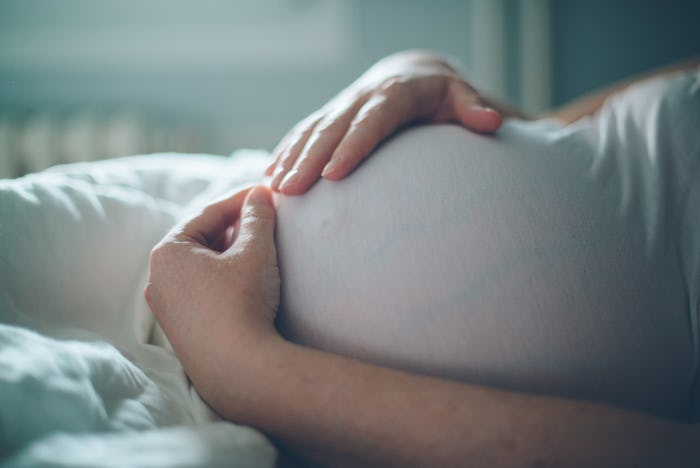Life

Here's How Being Stressed During Pregnancy Affects Your Risk Of Preeclampsia
Pregnancy can often be a stress-filled period of time, even if you don't want it to be. After all, there's so much to consider and worry about — what to buy, what to eat, what to read, how to prepare, and oh yeah, how to best raise that baby that you're soon going to have join your family. The term preeclampsia might have come up in your pregnancy research, and you might be wondering more about the possible link between it and stress. Stress definitely has implications on pregnancy, but can stress cause preeclampsia?
"Women who are experiencing stress during pregnancy may experience headaches, excess weight gain, and elevated blood pressures," notes Dr. Lakeisha Richardson, OB-GYN. "So stress can cause elevated blood pressure, and that can definitely make preeclampsia worse," she tells Romper. "However, the true etiology of preeclampsia is still unknown, and there are several theories."
According to the Mayo Clinic, preeclampsia is a very serious pregnancy complication that's typically characterized by high blood pressure and damage to other organs — mostly liver and kidneys. Women with preeclampsia typically have uncomplicated pregnancies and blood pressure readings for most of their pregnancies. Preeclampsia usually begins after 20 weeks of pregnancy, and even a slight rise in blood pressure can be a sign of preeclampsia.
Preeclampsia is one of the most common complications of pregnancy, notes Richardson. "It is diagnosed based on blood pressure and the amount of protein in a 24-hour urine collection," she says. When untreated or undiagnosed, preeclampsia can lead to seizures or eclampsia, HELLP syndrome, growth restriction of the fetus, and placental abruption. "However," Richardson emphasizes, "when diagnosed early and managed appropriately, these dangers can be prevented."
Patients can help to prevent these dangers by following their doctor's instructions, maintaining all scheduled appointments, and monitoring their symptoms closely. "The most common early symptoms of preeclampsia are headaches, blurry vision, and right upper quadrant pain," she says.
As Richardson mentions, the cause of preeclampsia is largely still unknown. Experts believe it begins in the placenta. As mentioned by the Mayo Clinic, in women with preeclampsia, the blood vessels that develop during pregnancy to send blood to the placenta seem to not develop or function properly. They're narrower than normal blood vessels and react differently to hormones, which limits the amount of blood that can flow through them.
Certain women are more likely to develop preeclampsia than others, according to the American Pregnancy Association. If you are younger than 20 or older than 40, have a history of preeclampsia in your family, are a first-time mother, have high blood pressure or kidney disease, or have a BMI of 30 or more, you could be at greater risk for preeclampsia. Being thorough with your doctor regarding your medical history and family medical history is extremely important in being able to get proper care and attention during your pregnancy.
There are a few things you can do to keep your stress and blood pressure levels at bay during your pregnancy. "Women can maintain a normal blood pressure by decreasing the amount of sodium or salt in their diet," recommends Richardson. They can also eliminate pork and other foods with high levels of sodium. "In addition, women should add stress relieving activities to their daily routines during their pregnancy, such as yoga, meditation, and daily walks." Though stress is only indirectly related to preeclampsia, it's important to keep your stress levels down with pregnancy. So anything that you enjoy and find relaxing can be a great thing to keep up with throughout your pregnancy.
Preeclampsia can be a scary thing to think about if you're pregnant, especially if you're gone through it before. Keeping track of your health, diet, and mental wellbeing are all vital to keeping your risk factors at bay. If you have any concerns regarding preeclampsia, be sure to talk your doctor. They'll be able to give you the best, most relevant advice.
Check out Romper's new video series, Bearing The Motherload, where disagreeing parents from different sides of an issue sit down with a mediator and talk about how to support (and not judge) each other’s parenting perspectives. New episodes air Mondays on Facebook.